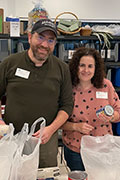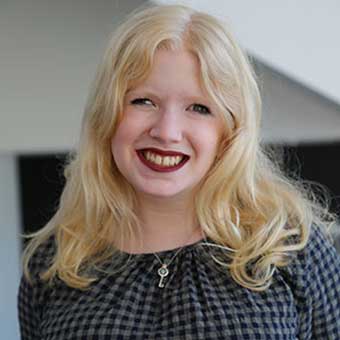Disability Research for a New Generation
The Lurie Undergraduate Fellowship offers opportunity to learn policy and create community.
By Karen Shih
For more than half a century, the Brandeis University community has championed the rights of people with disabilities, part of the school’s commitment to social justice.
In 1967, Professor Gunnar Dybwad founded what became the Nathan and Toby Starr Center on Intellectual and Developmental Disabilities at the Heller School for Social Policy and Management and used his platform to reframe access to accommodations as civil rights, rather than just medical treatment—a radical new approach at the time.
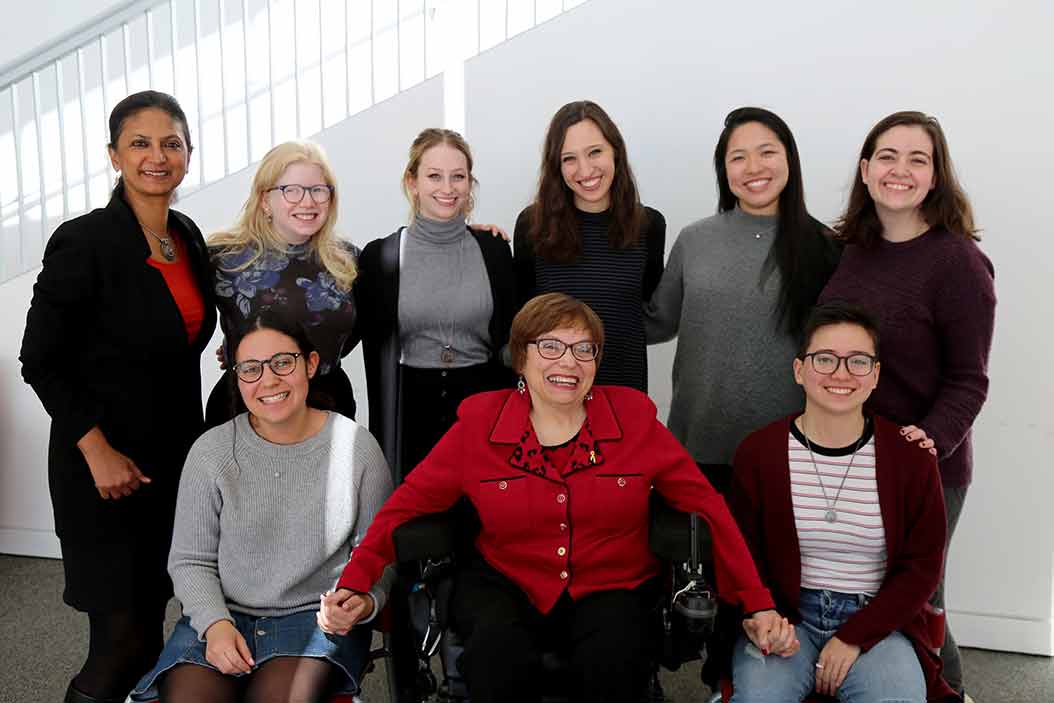
Back row from left to right: Monika Mitra, Shoshana Finkel, Alanna Levy, Norma Stobbe, Monica Chen, Rachel Steinberg. Front row: Shira Levie, Judy Heumann, Max Tang
Today, that drive to transform the lives of those most marginalized and stigmatized in society lives on in the Lurie Institute for Disability Policy, created in 2007. Its strong team of investigators and staff has made the center a leader in a number of research areas, including the rights of parents with disabilities, pregnancy and disability, and community living policy. But five years ago, the leadership team was confronted with an important question.
“How can we as a research institute not only ensure our research is of the highest rigor, but think about the next generation and make our work as sustainable as possible?” says Lurie Assistant Director Amy AbuShanab, MBA’21. That led to the creation of the Lurie Undergraduate Fellowship in Disability Policy in spring 2019, a year-long research program that expands the center’s reach across campus. It’s open to all undergrads and is about to welcome its sixth cohort this fall.
“How can we as a research institute not only ensure our research is of the highest rigor, but think about the next generation and make our work as sustainable as possible?”
Amy AbuShanab, Lurie Assistant Director
During the summer, AbuShanab contacts the new fellows with information about existing Lurie research projects so they can pick what’s most interesting to them, then matches them with an appropriate mentor. Throughout the school year, fellows meet weekly with mentors, and attend biweekly workshops with other Lurie researchers, librarians, advocates and more. By the spring, many fellows present their work externally at conferences and submit papers, and they wrap up the semester by sharing their work with the Brandeis community.
“I want to thank the Lurie Institute for taking a chance on undergrads,” says Shoshana Finkel ’19, one of 30 alumni of the program. “For dealing with us with a lot of patience and grace, and for believing we can be diligent researchers, not just doing odd jobs or grunt work.”
It’s a two-way street, says AbuShanab. “We really benefit greatly from the fellows’ work, fresh perspectives and connections to the disability community — especially the younger disability community.” Fellows like Finkel, who is legally blind, are part of the pipeline of new disabled researchers the institute hopes to cultivate through the fellowship.
AbuShanab knows that not all of them will stay in the research realm. But ultimately, “our goal is that any industry our fellows go into, from city planning to medicine to law, disability inclusion and accessibility is part of the conversation from the very beginning."
Shoshana Finkel ’19: An Eye-Opening Look at New Career Paths
Advocating for the health care needs of people with disabilities has always been Shoshana Finkel’s goal. But after feeling frustrated and bored in science classes like chemistry, she knew she had to make a change from her original plan of becoming a nurse or genetic counselor
“I realized I loved my public health policy classes while my science classes were making me miserable,” says Finkel ’19, a Health: Science, Society and Policy (HSSP) major. “The fellowship came at a perfect time.”
Through the Lurie Fellowship, she was introduced to experts and advocates in the disability field, which opened her eyes to new career paths. One in particular was senior research associate Robyn Powell, PhD’20, now a law professor at the University of Oklahoma.
“I realized that disability and public health law is exactly what I want to do,” says Finkel. Today, she’s a recent grad of Brooklyn Law School aiming to work in public service or for a nonprofit organization.
As an undergrad, Finkel quickly got involved in legal advocacy alongside fellow students with disabilities to ensure the university was doing more than just complying with the Americans with Disabilities Act, but taking further steps to create a truly accessible, inclusive college experience for everyone. They fought to ensure that professors better understood the accommodations process, for example, and that students had more access to vans and ramps necessary to navigate to their residence halls and classes.
“The law is one of the lines of defense for people with disabilities.”
Shoshana Finkel ’19
Realizing she needed more research experience to complement her advocacy, she became part of the first cohort of fellows. Mentor Ilhom Akobirshoev, PhD’15, a Lurie research scientist, was patient and supportive, Finkel says, as she learned both qualitative and quantitative skills, including how to use Stata.
That gave her an upper hand as she applied to internships throughout law school. Over the last three years, she’s worked at the Centers for Disease Control and Prevention’s Public Health Law program; the New York Legal Assistance Group’s Legal Health team, a medical-legal partnership that serves patients referred by doctors and social workers from New York City hospitals; and the New York Attorney General Office’s Health Care Bureau.
She’s also grateful for the perspective the fellowship has given her as a law student. She recalls reading the case of Buck v. Bell, a 1927 case about a “feeble minded woman” who was committed to a mental institution and forcibly sterilized, taught in all constitutional law courses. “There’s often a lack of compassion in the legal community in talking about these cases, and having met so many incredible advocates through this fellowship, I was able to think about these cases from a human level,” she says.
Now, her long-term goal is to combine her passion for advocacy and research to ensure that civil rights are being upheld across the country. “The law is one of the lines of defense for people with disabilities,” she says.
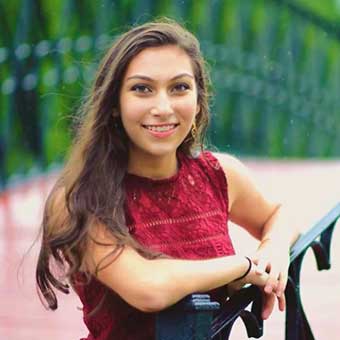 Aishwarya Khanna ’21: Empowering Marginalized Populations
Aishwarya Khanna ’21: Empowering Marginalized Populations
Aishwarya Khanna ’21 isn’t yet sure which area of medicine she wants to pursue—but she knows no matter which population she treats, she’ll take a person-centered approach for every patient she sees.
That’s thanks in part to the Lurie Fellowship, which gave her the chance to delve into the pregnancy outcomes and experiences of people with intellectual and developmental disabilities (IDD) through her research.
“We saw many examples of people with IDD whose concerns were dismissed in health care settings,” says Khanna. She had previously worked with other underserved populations, including through an internship at Bellevue Hospital in New York City, a “safety net” institution that serves people who are unhoused, incarcerated or don’t have insurance. Combined, the experiences “made me really impassioned to help people who are marginalized, whose voices aren’t heard and who are consistently given the short end of the stick.”
“If you know that you want to go into a service-oriented field, the fellowship is something you should pursue.”
Aishwarya Khanna ’21
Under the mentorship of Lurie Institute Senior Research Associate, Lauren Smith, Khanna learned to analyze and code interviews with pregnant women with IDD. She became the first author on a published study in the Disability Health Journal, and presented at conferences including the Northeast Science Symposium and the Society for Disability Studies.
She credits that research experience with getting her a job with the Veterans Health Administration, working on a quality improvement study, which she did for a year before matriculating at UMass Chan Medical School in fall 2022.
There, she’s continued to learn more about the needs and concerns of patients with disabilities through a program called Operation House Call, where students meet regularly with families of children with disabilities, especially autism, to hear about their experiences with health care and learn how to better serve them.
“If you know that you want to go into a service-oriented field, the fellowship is something you should pursue,” Khanna says. “We all have knowledge gaps. In life, in the media, even in our curriculum, we don’t always highlight the needs of people with disabilities. Through the fellowship, you can do really impactful work and learn skills that can serve you and the broader community when you graduate.”
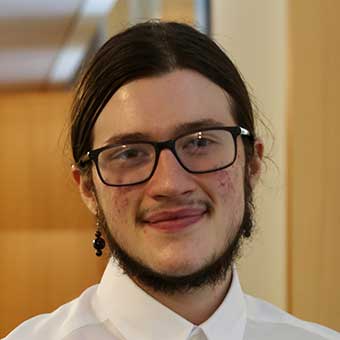 Alexander Cheetham ’24: Creating Community
Alexander Cheetham ’24: Creating Community
Brandeis was the clear choice for Alexander Cheetham ’24, right from the start. As a student with disabilities, his grades had dropped when he was sick for a period in high school, and Brandeis was the only school that allowed him to explain the situation on the application, making him feel seen and respected from day one.
“It’s a really important part of my identity,” says Cheetham, who is neurodivergent, visually impaired and has an auditory processing disorder. “I do a lot of disability activism, and to find a fellowship specifically focused on the disability community and policy—as well as the community-building aspect—was appealing to me.”
The camaraderie with his fellow cohort members gave him the opportunity to bounce ideas off of them for presentations, as well as delve into ideas for advocacy or discuss books that resonate. For example, when they read “Year of the Tiger,” by disability activist Alice Wong, he was struck by the “wonderfully ethereal, almost sci-fi” conversation Wong writes between her present and past selves. “For marginalized and disabled people, it is really cathartic to think about talking to your little self about how things have progressed and the things you get to do, as well as think about the things that get harder and the way we learn to adapt,” he says.
He has a strong relationship with his mentor, also Akobirshoev, as well as many of the other faculty and staff of the institute, who regularly host research workshops. It’s been particularly useful to see how researchers with disabilities conduct their work, submit papers and make connections, Cheetham says.
“Providing access and support to mental health care is something that’s incredibly important to me.”
Alexander Cheetham ’24
He was excited to have the freedom to choose his own research topic. As a user of American Sign Language, Cheetham chose to examine the health care experiences and outcomes of Deaf and hard-of-hearing students, as well as their educational experiences, using the National Survey of Children’s Health from 2021. After doing qualitative research for other classes, using a massive quantitative data set was a daunting but exciting experience. Now, he’s been invited to present two abstracts at the Academy Health annual meeting and is working on papers for journal submission.
He hopes to become a therapist, focusing on queer and disabled communities and plans to pursue a master of social work degree after graduating from Brandeis. “Providing access and support to mental health care is something that’s incredibly important to me,” he says.
Going into his last year of undergrad, he plans to strengthen the networks he’s developed through the fellowship, build off of his existing research for his senior thesis and support the new class of fellows starting in the fall.
“I feel so fortunate, so I want to create those connections for other people as well,” Cheetham says.
